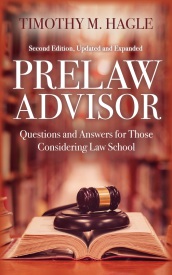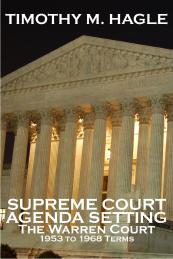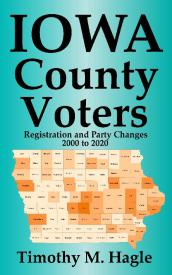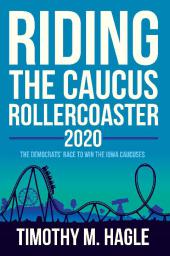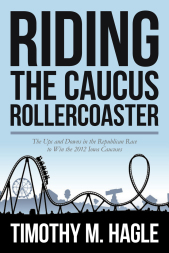
Contact Info
347 Schaeffer Hall
319-335-2348
timothy-hagle@uiowa.edu
Twitter: @ProfHagle
Spring 2024 Office Hours
Tue & Th: 4:45-6:15
Mailing Address
Dept of Political Science
341 Schaeffer Hall
20 E. Washington Street
The University of Iowa
Iowa City, Iowa 52242
News
Posted updated Prelaw FAQ for UI students
Posted updates to 12 papers in Iowa Voting Series for 2022 election data
New Book, Supreme Court Agenda Setting: The Warren Court, published for Kindle devices and computers with Kindle reader.
Published updated and expanded edition of Prelaw Advisor in paperback and for Kindle readers
My books
POLI:1002/30:021 Lawers in the American Political System
Written Responses
Below are the written comments I've received for POLI:1002/30:021 (taught Fall 2011 as 30:119). Each semester's comments are grouped together, with more recent comments at the top. I will reproduce the comments as accurately as possible. This will include spelling and grammar errors (but I won't mark them with [sic]). Any response or comment I have will be in italics following the student's comment.
Semesters: S 2014, F 2012, F 2011
[It appears that this website doesn't recognize the internal page links when I copied this material over from my old website. Until I figure out an alternative you'll have to just scroll down if you are interested in the comments from older semesters.]
The student who wrote the first comment below REALLY didn't like the course or at least the way I taught it. I'll deal with the specifics of those comments below, but a few words of explanation for this semester help to provide some context.
The courses I was planning to teach during the 2013-14 academic year were thoroughly messed up for reasons I won't go into. Although I hadn't initially planned on teaching this course during Spring 2014, I was fine doing so and it worked out fairly well in terms of the scheduling for the course and its enrollment. Speaking of which, I had initially designed the course to be discussion-based, so I felt that about 20 was the maximum I could have and still allow everyone to participate fully. Unfortunately, because of the mix-up and low enrollment in my other courses I had to accept a higher number. Fortunately it wasn't too much higher (mid-20s) but it still proved to be a problem. The previous two times I taught this course there were about a dozen students in it. That made it fairly easy for everyone to become comfortable speaking in class on the day's topics. They also tended to be third or fourth year students, so were generally more willing and able to comment in class. This semester I had about 25 students and there was more of a mix with some first and second year students.
I don't know whether it was the larger number of students in the class or that more of them were first and second year students, but a willingness to discuss the material became a major problem. I would start each class with a discussion of "lawyers in the news," (basically current events) which was an opportunity for them to bring up any legal issue they wanted to discuss. I usually planned for this initial discussion to last 30-45 minutes, but sometimes I would let it go longer if there was a good discussion in progress. We would then turn to the materials assigned for that day's readings. Sometimes this would take the same discussion-based format, sometimes it would be more of a lecture on my part. In the discussions there were three students who were very willing to participate, sometimes too much so as they would tend to dominate the discussion. I would sometimes shift the discussion away from them to give others a chance to jump in, but there were only a few others that were usually willing to do so. Many would only make comments when forced to. It struck me as odd that they were not more willing to join the conversation given that 25% of their grade was based on the class discussions. After a few weeks I started to be concerned that some of the students would have little or nothing on which I could base a discussion grade, so I began to give them specific things to discuss and would go around the room to force everyone to speak. That helped, but the comments of one person rarely generated discussion of anyone else. Despite various attempts by me to get more students to participate it just wasn't working. Given the willingness of students in the prior classes to participate, I wasn't really prepared to have a class where so few students were willing to speak up.
----------
Discussions were poorly guided and provoking questions were rarely asked by the prof. Much time was spent talking at us, and his comments rarely added anything of value. For example, the prof once spent just shy of 10 minutes (I timed him) explaining the difference between 1st and 2nd degree murder to an int'l student. I find this prof to be well-intentioned but largely out-of-touch. 80% of class discussions were dominated by one or two individuals and input was rarely sought after from the rest of the class.
This student was clearly unhappy with me, but I think she (I'm going to stereotype and assume female given that the handwriting is quite good) overstates her case. I've thought a lot about these comments and I have several responses. I'll take her points in the order presented.
I think the student and I have different conceptions about how a discussion should be run, or at least how I ran them in this course. She apparently wanted something much more structured than what I intended. For the initial current events discussions it was up to the students to raise topics. I would then make some comments and ask a few questions. If there didn't seem to be much interest in further discussion we would move on to the next topic or to the day's readings. In the discussions of the day's readings I would usually have more direct questions, but sometimes I would let the discussions be free flowing here too. The essence of the course was to learn about lawyers in the American political process, which is the title to the course. There weren't specific facts they had to know and grades weren't based on tests, so discussions were more to allow students to ask questions they had about the topics or material. I've noted above that attempts to get more students participating in class discussion were largely unsuccessful. This student may not have liked the questions I asked in attempts to generate additional discussion, but I did ask plenty of them.
The "talking at us" comment is interesting. I suppose the "at" versus "to" distinction is one of perspective. For me talking "at" students would be more along the lines of just standing in the front of the class and lecturing with no particular inclination to engage students in a discussion of the material. I don't do that even when I am lecturing. I always make eye contact with my class even when I am lecturing from prepared notes. For this class I did not have extensive notes to read or lecture from and I was always trying to get them to engage in discussions. To the extent I did give mini-lectures it was either specific to the day's material (such as explaining a paper assignment) or when I couldn't get anyone to participate in a discussion.
It's a bit harder for me to respond to the "value" part of that comment. There's not much I can say if she didn't find value in the things I was telling the class. One possible reason for such a comment might have been if this student was more advanced, a senior perhaps. The course is intended for first year students, but often attracts third and fourth year students. Pitching an "intro" course at first year students, as such courses should be, can make it boring for more advanced students who might know a lot more of the material at that point. Of course, even if she already knew about something I was discussing didn't make my comments any less valuable. The example the student gives suggesting that my comments did not have value doesn't support her point. Is she saying that I shouldn't have answered the international student's question regarding the difference between first and second degree murder? I would hope not as I was happy to answer any question the students had about the law. I don't recall the context in which the question arose, but degrees of murder are often mentioned in the news and it would certainly be of interest to know the difference. Ten minutes also doesn't seem to be an unusually long time to devote to the topic, particularly if the student was having difficulty understanding it. (Also a bit odd that the student timed my explanation. Was she doing this for all my comments?) I doubt that this student already knew the difference between first and second degree murder. It's fine if she's not interested in that point, but, again, it doesn't make it of no value.
I wish this student had provided some support to the "out-of-touch" comment. As is, it's a vague criticism. Does she mean I'm out of touch with the material. That can't be it regardless of what she thinks. One of the assignments in the course was for the students to interview a currently practicing attorney to ask about the things we discussed in the course regarding law school preparation, career choices, etc. The students then gave presentations on what they learned in the interviews. Almost every single student's interviewee confirmed material I had presented in class, which certainly doesn't support the out of touch criticism. Perhaps the student was suggesting that some of the materials I had them read were out of date. I did have them read some books that were fairly old (e.g., One L), but we always talked about similarities and differences with current legal education, etc.
I agree with the criticism that 80% of the class discussions were dominated by three (not one or two) individuals. I completely disagree with the suggestion that I did not seek input from the rest of the class. For most of the discussions I acted as moderator, calling on students when they raised their hands. I've already noted that only a few students beyond the main three were willing to participate and that I had to start forcing participation by going around the room and having everyone contribute. For some of the discussions I would let the students carry on so that my influence did not disrupt the flow of the conversation. Even in these instances, however, I would intervene if the discussion became too heated or I wanted to see if others wanted to make points. In question 9 of the multiple choice portion of the evaluations I ask the extent to which I had encouraged questions or class participation. Twelve of the 17 who did the evaluation said "very much" and four others said "quite a bit." Only one student, this one I assume, responded "not much."
Clearly this course and the way I ran it didn't "click" for this student. That's unfortunate, but the particular criticisms the student makes don't really hold up. Plus, if she wasn't enjoying the class I wish she would have said something to me sooner when I could have done something about it (i.e., during the semester). I tell students the first day to let me know if they are having problems with the course. If she had we could have discussed the issues and perhaps I could have helped resolve them. She didn't and ended up getting less benefit from the course than she might have.
----------
I wish that there was more guidance on what was expected of us on the paper assignments. It was nice to ask a lot of questions to the lawyer, but I found it difficult to write the paper because I wasn't quite sure what you wanted us to write about.
Sometimes class discussion gets heated and feels like if you participate another student will laugh at you or tell you you're wrong.
In most of my classes I assign one paper. Although I give the students a lot of guidance on how to write the paper, both in terms of style and substance, they only get one shot at it and I don't have an opportunity to see improvement unless they enroll in another of my courses. For this class I wanted to fix that problem so I assigned an initial short paper (five pages) that would allow me to see their writing style and give them feedback which they could use to improve for the longer (ten page) paper. The initial short paper was for them to just write up what they learned from the interview they had to conduct with a practicing attorney. The goal of the paper was primarily as a writing sample, so the substance, other than being based on what they learned in the interview, was up to the students. A few students, apparently including this one, seemed to want more guidance than that.
I've mentioned the issues with the discussions in this class above. One of the three students who tended to dominate the discussions had a style that was a bit more confrontational than some would prefer. I recall one time in particular when I did intervene when things got too heated, but "too heated" is a variable concept. What I might have seen as a vigorous discussion another might view as intimidating. That said, in a class full of students who are interested in going to law school one should be willing to jump into conversations and defend positions on occasion. Then again, there needs to be a balance particularly for those students who are less accustomed to a vigorous give and take.
----------
Really enjoyed this class. I felt like the material that needed to be learned was taught in an efficient way.
Glad you enjoyed it!
Informative class. Challenging, but necessary for those contemplating law school.
I'm glad this student thought the material was informative. Also that he or she found it a bit challenging. The material is pretty straight forward, so I didn't want to make it too easy, even though it's an introductory course.
----------
The relaxed and open atmosphere of the class was my favorite part. I think you should continue to keep this as a smaller class so everyone can feel involved on a weekly basis.
A good portion of the class involves in-class discussions. To be effective, and to make sure everyone has a chance to participate, I would also like to keep the class size relatively small (20-25). Unfortunately, there's pressure to increase enrollments so the next time I teach it the cap will be set at about 40. If that many sign up I'll have to make some adjustments in how the class is run, but hopefully I can still manage to keep everyone involved.
----------
I would suggest dropbox because it assures the student that their work has been received.
It's been a while since the end of the course and I don't specifically recall what might have prompted this comment, though I think one student claimed to have turned in a paper that I didn't get.
----------
I enjoyed this course. I believe a little more clarity should have been given on the first editing assignment.
I seem to recall a lot of variation in how well the students did on that first assignment. Based on this comment some may not have had a good handle on what I wanted for the assignment, so a bit more explanation is probably a good idea.
-----------
A really helpful course about a introduction to law school. I would recommend it to all Pre-Law students.
I'm glad this student found the course helpful. A central theme of the course is to help those interested in law school (or, more specifically, becoming lawyers) to understand what lawyers do, what law school is about, and how to prepare for them.
----------
Informational, hands on class. I enjoyed the texts we read and film we watched. I enjoyed the discussion based class, but wish there had been more students, o there would have been more participation overall. I enjoyed this course -- thank you.
Thank you, and I'm glad this student enjoyed the course.
I agree with the student's comment about class size and participation. Although I do want to keep the class size relatively small, as I noted in a comment above, this semester it was right at the minimum and when two or three were absent on any given day it put more pressure on the others to participate more. That's not necessarily a bad thing, but not everyone felt gabby every week. My preference would have been about 20-25 students so that there would always be enough to keep a discussion going.
LOVED this course!
Very relaxed but learned alot of very valuable info!
The small class setting REALLY helped with discussion and engagement which you don't get at Iowa.
This was my first time teaching the course in the expanded format (i.e., as a three credit course) and we had a very small enrollment. This worked out very well in terms of having lots of discussion. All of the students had plenty of opportunity to participate and it was easier for me to keep track of who was participating and who wasn't. Unfortunately, I won't be allowed to have such as small class size (15-20) in the future.
----------
Keep class somewhat small. Listen to Professor Hagle or else.
HA! I guess we'll be into the "or else" category.
----------
Please maintain small size.
----------
Loved this course. Small(ish) class size encouraged discussion among everyone.
Yep, unfortunately . . .
----------
Please keep the class small! This class forced me to think about my future and the interview was invaluable. Also, the presentation was a nice change from most Poli. Sci. courses. One of my favorite undergrad courses!!!
You might wonder a bit that all five of the written comments mentioned the value of the small class size. What happened was that during the last class period many of the students noted that they really enjoyed the small class size, so I told them to say so in their evaluations.
One of the benefits of the smaller class size was that it provided an opportunity to have each of the students do an interview with an attorney and then give a presentation (speech) about it. Speaking skills aren't often emphasized in Political Science courses, but they are important for lawyers. Unfortunately, this may be something that will have to be changed for a larger section.
